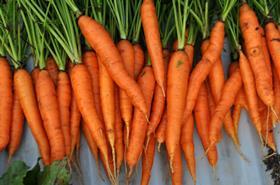
The organic sector has called for a clearer government contingency plan to avoid export delays and ensure the trade of organic produce with the EU continues in the event of a ‘no deal’ Brexit.
The Organic Trade Board (OTB) and the United Kingdom Organic Certifiers Group (UKOCG) said that while the recent Defra technical notice provided some assurance that possible solutions were being ‘explored’, it lacks detail.
The notice, issued on 23 August, warned of the need for a new traceability system and potential nine-month delays to organic food exports.
According to a government technical notice issued today (23 August), the UK will become a third country if no agreement is reached by 29 March 2019, meaning UK businesses would only be able to export to the EU if they were certified by an organic control body recognised and approved by the EU.
To achieve that recognition, UK control bodies would need to apply to the EC, but would not be able to do this until the UK has left the union. The process can take up to nine months, though the British government said it is exploring ways to speed up the process.
“There has been speculation about how the UK will continue to trade organic goods with the EU if a deal isn’t reached and the recent Defra technical paper has failed to provide sufficient assurance that the necessary precautions are in place,” said Roger Kerr, chairman of UKOCG.
The paper indicated that UK organic control bodies would be able to continue certifying UK organic operators for trade in the UK, and that the UK intends to continue to recognise those countries currently equivalent to the EU, such as the USA, Canada, Japan and South Korea.
However, in the event of the UK becoming a ‘third country’, any organic control body from within the UK or the EU must apply for equivalence to the EU Commission to operate in that ‘third country’ under Annex 4 of Regulation 1235/2008.
“This process cannot proceed until the UK is deemed to be a ‘third country’ which could well be not until 1 April 2019 and it normally takes around nine months to complete,” Kerr said. “If there is a transition period agreed, then the application process could take place during that period.”
Kerr stressed that a clear contingency plan is needed immediately, saying the best course of action would be forgovernment to negotiate a mutual recognition agreement with the EU ahead of Brexit day.
It recommended one similar to those identified in the Brexit technical paper with the USA, Canada, Japan and South Korea. However, with just over five months to go, Kerr said time was running out and emphasised the importance of starting discussions now.
The chairman of the OTB Adrian Blackshaw said it should be fairly easy to negotiate an agreement setting out mutual recognition of standards with the EU: “The UK will adopt EU regulation when we leave the EU, and so will be equivalent, if not compliant, by default.”
While the negotiation of a mutual recognition agreement is 'by far the best course of action', according to the OTB and UKOCG, it isn’t the only option.
“Another option is the EU unilaterally accepting organic imports from the UK in recognition of the interdependency of the organic supply chain across the EU,as the UK government has indicated they are prepared to do so for all organic imports coming into the UK,” said Blackshaw.
“The final option is that government could apply for the UK as a whole, to be deemed a country of equivalency under Annex 3 of Regulation 1235/2008.Again, this is a prolonged process but could be fast-tracked if all parties want this outcome.”
Kerr reported that both UKOCG and the OTB are currently in talks with Defra and are working closely withthe International Federation of Organic Agriculture Movement (IFOAM EU) to develop a suitable plan of action.
“We want to see communications begin between Defra and the EU Commission that ensure the necessary contingencies are in place in the event of a ‘no deal’ Brexit,” he said.
“All options must be explored, and we will beworking alongside agencies and organic organisations across the EU to ensure trade continues to flow regardless of the final nature of the EU-UK agreement.”



